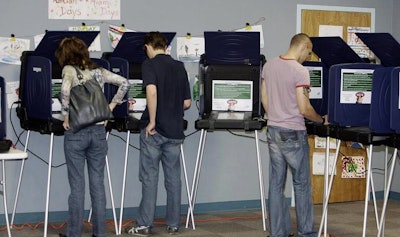
By Tim Hermes, Publisher
If you had looked at the results from the various pollsters last June regarding Measure 91 in Oregon, the legalization of marijuana for personal use and for retail sale in the state, you would have seen what could have been called a slam-dunk - over 51-42% in favor of passing the measure. Game over.
But a spate of troubling news over the past several weeks, especially the controversy about THC-laced edible products and several well-publicized incidents with teen use in Colorado, plus a new poll showing Coloradans now are mostly against legalization, has tightened the polls considerably. And the local "No-on-91" effort is having an impact as well. Now, the polls stand roughly at 44%-40% in favor of Measure 91 passing. The margin of error is +/- 4% according the the Portland Tribune's SurveyUSA poll. That's tight. And the anti-91 group is pushing the right buttons for its cause - using the packaging of edibles and the potential for children to access and ingest - as its rallying cry. (While some outlets are saying this poll is skewed because of semantics, let's assume for now it's accurate.)
The result? Close to a nail-biter, right?
Wrong.
In fact, this may be a lot worse than it appears. But don't blame a flawed poll.
Mid-term elections are known to be low-turnout affairs. Only the diehards, ultra-motivated, and people with time on their hands go to the ballot box during mid-terms. It's been a trend for decades and not a lot will change that. Of those that do turn out, a disproportionate number of them are the elderly - who, coincidentally, are the most strongly opposed to the measure.
On the other hand - you guessed it - the strongest pro-legalization group in the poll is the 18-34 age group, and - you guessed it again - that is the group least likely to vote on Election Day.
If you have a poll showing a dead heat, with a motivated base on one side, and a more (potentially) sanguine group on the other, the issue being voted would need to really hit home for the latter to rally off the sofa, find their ballot, fill it out and get to a mailbox on time. (Fortunately for the pro-91 electorate, MJ legalization may just be that issue. May be.) The mail-in ballot may work against the vote as well, as the young move around a lot - their ballot may not follow them. (publisher's note - thanks to the vigilant reader who caught the error on our assumption that OR still uses the ballot box.)
Oregon is a geographically huge coastal state, with high-density cities and a vast interior. Much of the vote's chance of passing will hinge of course on Portland and it's suburbs. And both pro- and anti-91 groups are scrambling. The Pro-91 movement has found allies in unlikely places, like retired chief federal prosecutor Kris Olson and retired Oregon Supreme Court justice Bill Riggs. Meanwhile, the No-on-91 movement continues hammering the issue using the child-safety angle and citing other dangers to the community.
If the get-out-the-vote effort succeeds, and the 18-34 age group has enough passion about legal MJ to get to the mailbox a few days early or drop it off Tuesday morning on the way to work, 91 should breeze through. However any number of things could happen. Weather, for instance always has an effect on turnout, and in rainy coastal Portland, a soggy few days could mean suppress the vote from a crucial part of the electorate, and a bad ending for legal pot in Oregon.
But there's more at stake. Many see Oregon as the legalization "bridge" connecting Washington state with California - comprising the entire West Coast. If Oregon tips to legal weed, California will assuredly be next when they vote in 2016. The Marijuana Policy Project already has boots on the ground and is putting together their war plan for California. California's AG is already exploring the tax benefit of weed, and well, we all already know about California's silent cash-crop. If Oregon's issue does not pass, it not only sets back that state, but will have a ripple effect across the industry. Many investors are already gathering troops at the border, ready to plunk down the cash to set up shop. The Oregon Liquor Control Commission has had thousands of inquiries about dispensaries and other business licenses already. The heady 1998 Silicon-Valley-ish aura that has gripped the MJ industry is already pervasive in the Beaver State. But an election comes first. And while legalization still has an edge, well, it won't be a slam dunk.
More like a 15-ft. jumper with no time left.



























